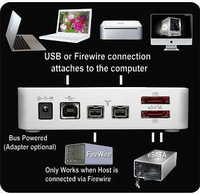FirmTek targets MacBook Air owners with hub for FireWire, eSATA


Macs will connect to the hub with either a USB2 or a FireWire 800 connection. The hub comes with 2 eSATA ports and another FireWire 800 port for hard drives.
Of course, the MacBook Air comes with only a single USB2 connector and that's it. The concept is that users will use 802.11n for networking and connecting with storage, such as Apple's Time Capsule or a drive connected to its AirPort Extreme router.
SeriTek/SpyderHUB will be able to use the hub for FireWire storage, as well as boot from FireWire. The lack of FireWire was one reason given by some prospective customers to nix an MacBook Air purchase, so this accessory could open the door to some new users. (Still, as I mentioned in a post a while ago, if you believe that there's a lack of anything about the MacBook Air, then you should just forget about it.)
For many Mac users, the most important feature of the new SeriTek/SpyderHUB will be eSATA booting. Many MacBook Pro users purchased eSATA ExpressCard 34 dual-port cards to use with external single- or multi-drive storage units. But surprise: while they work great as a file dump, most of them don't support booting for Mac OS X Tiger and Leopard with the eSATA interface.
The SpyderHUB provides Mac OS X boot capability to any direct connect eSATA enclosure using the built-in, high quality, FirmTek eSATA to FireWire 800/400/USB 2.0 converter. This feature not only increases connectivity options but also enhances flexibility by providing instant eSATA boot capability for all currently shipping Macintosh computer models.
I speak from experience here. When I bought my first-gen, Core Duo MacBook Pro, I also sank some cash into an eSATA card and an external drive that sports eSATA and USB2 interfaces. The drive worked with Tiger —excluding boot — and it can boot with USB2. This setup had troubles with Leopard early on and I have yet to fiddle with the updated drivers that supposedly let the ExpressCard work again. Still, as far as I know it won't boot Leopard or Tiger. So, FirmTek's hub sounds useful.
The SeriTek/SpyderHUB also provides hardware RAID support for striping.
It also provides hardware RAID 0 and concatenate options for users that would like to configure a hardware RAID that can be used with a PC or Mac OS X. This embedded hardware RAID feature allows a SpyderHUB hardware RAID to be moved between PCs and Macintosh computers when Master Boot Record is selected as the partition format.
FirmTek's features list says that it supports JBOD, RAID Level 0 and Concatenate SPAN modes. My interpretation of this is that the button on the device can toggle between Just a Bunch of Disks; a striped set made from two dissimilar drives (or maybe more), such as a FireWire and eSATA drive; and a "span" set made from pair of eSATA drives.
Customers should note that while Apple allows HFS+ volumes on Master Boot Record partitioned drives, Leopard can't resize a MBR partition. In addition, Master Boot Record partitions aren't supported by Time Machine.
There's one small thing about the name of this product. Spyder is a brand used for many things: racing cars, sporting goods, and paintball guns.
In the technology field, albeit in a very vertical market, it's a brand for hardware-based color calibration technology. I've used one to calibrate my monitor. Will that be a sticking point?
Whatever the name, Firmtek's hub sounds interesting.